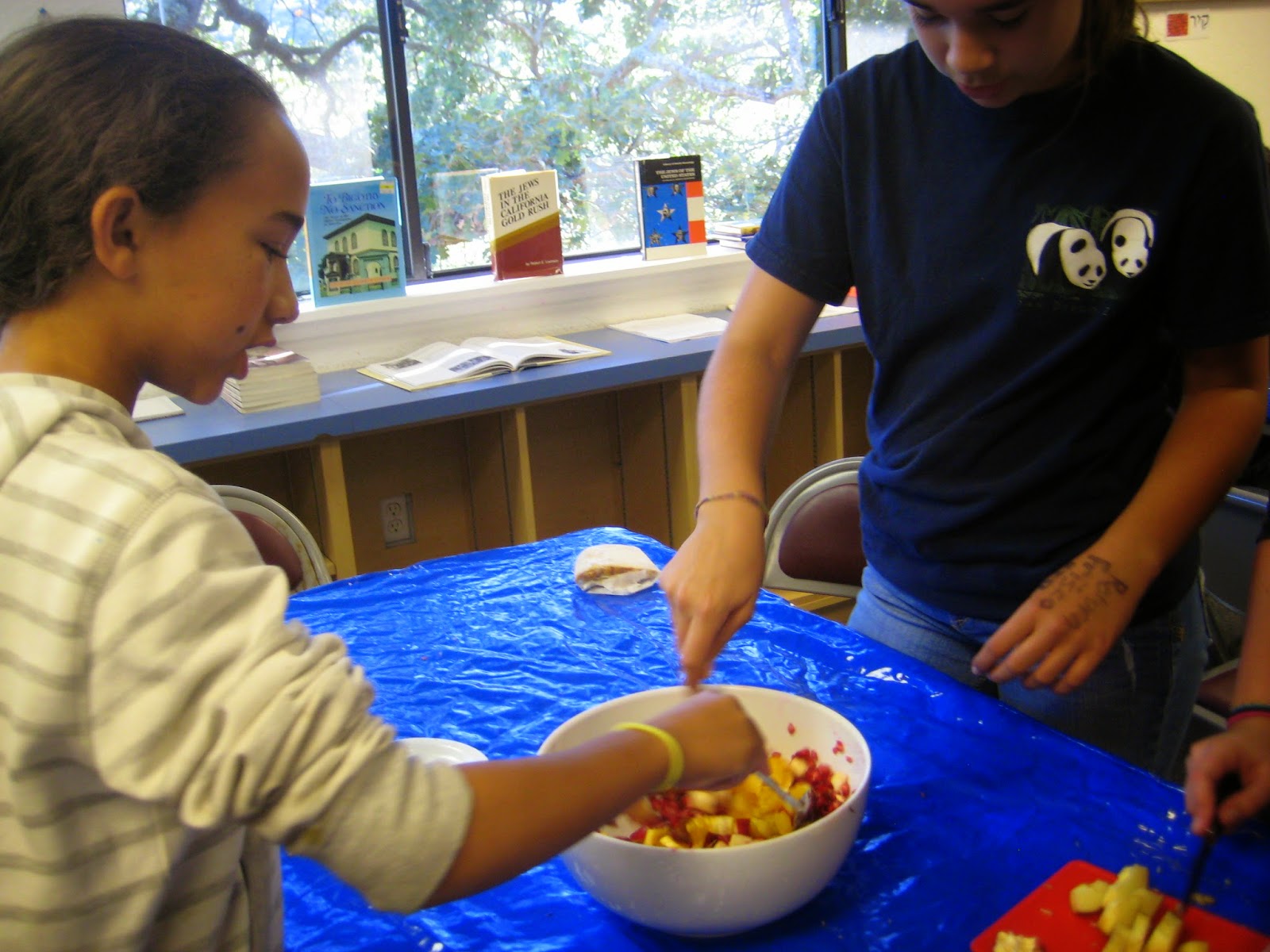After briefly reviewing how the earliest Jewish communities in the United States were settled by Sephardi Jews fleeing the Inquisition, with a few Ashkenazi Jews from England and Germany (mostly wealthy merchants) joining them in the 18th century, we continued our historical journey of our American Edah by viewing a video segment from the
Heritage: Civilization and the Jews program about a sudden surge in Ashkenazi immigration to the United States beginning in the 1820's and continuing through the 1850's (minutes 13:09 to 17:49 on the video). At the same time that Jewish communities in the German territories of Bavaria and Prussia were experiencing economic, social, and religious discrimination, the United States was encouraging its citizens and any new immigrants to settle in the Louisiana Purchase territory acquired from France at the start of the 19th century. Over 200,000 Jewish immigrants left the "old world" for the "new."
.JPG) |
| We learned that many young Jewish men became peddlers who often had to walk many miles between frontier farmhouses carrying packs weighing 100 pounds. Theirs was a lonely and dangerous life - many were robbed and some were murdered for their goods. |
During our weekday sessions, we read letters, newspaper clippings, and personal memoir accounts of Jews who, during the late 1840's and early 1850's, made their way all the way west to California, to participate in the Gold Rush. These documents taught us about the Orthodox Jewish lives they left behind in Europe, the reasons they left, the conditions of the boats that took them to the North American continent, the difficulties they encountered keeping even the most basic of Jewish laws and traditions, and how they managed to do so in spite of the difficulties. And amazingly, we learned how easily they were accepted by non-Jews in the gold mining towns, who were quite fascinated by the Jewish holidays and, according to a Marysville news clipping from 1852, considered the Jews to be "some of our best citizens!"
During the weekday sessions, we took a break from our usual Hebrew Through Movement sessions, in order to teach Hebrew vocabulary through cooking. All the fifth and sixth graders prepared a "Seemaneem (Symbolic) Fruit Salad", a popular treat in Israel this time of year, during and after the Sukkot holiday. The symbolic fruits included in the salad are pomegranates (which are often associated with the Torah, since there are supposedly 613 seeds in each pomegranate, the number of commandments in the Torah), apples (eaten with honey on Rosh Ha'Shana), dates and oranges (both of which grow in the Land of Israel). There was a lot of cutting and chopping and slicing in Rooms 201 and 202 both days, resulting in a very refreshing and delicious fruit salad.
.JPG) |
| Reisheet kol, leer'chotz et ha'yada'eem eem sabon. (First of all, wash the hands with soap.) |
.JPG) |
| Achshav, leech'toch et ha'reemon eem sakeen l'kama chalakeem. (Now, cut the pomegranate with a knife into several pieces.) |
|
.JPG) |
| It's not easy cutting a pomegranate - it takes focus and a strong arm! |
.JPG) |
| Az, l'hafreed et gar'ee'nei ha'reemon v'la'seem otam l'toch ha'ke'ara ha'g'dola. (Then, separate the pomegranate seeds and put them into the big bowl.) |
.JPG) |
| Leech'toch et ha'tapoo'ach l'chalakeem k'taneem. (Cut the apple into small pieces.) At this point, with only half an hour for the session, each student at the table was focused on performing a different task. |
.JPG) |
| L'kalef et ha'tapooz... (Peel the orange...) |
.JPG) |
| ...v'az leech'toch et ha'tapooz l'chalakeem k'taneem. (...and then cut the orange into small pieces.) |
.JPG) |
| L'pares et ha't'mareem. (Slice the dates) |
.JPG) |
| Leesh'foch meetz tapoozeem v'meetz leemon me'al ha'peirot. (Pour orange juice and lemon juice over the fruits.) |
.JPG) |
| U'va'sof, l'arbev et ha'kol b'yachad. (And finally, stir everything together.) |
.JPG) |
| La'seem salat seemaneem l'toch ke'ara k'tana. (Put symbolic fruit salad into a small bowl.) |
.JPG) |
| L'varech al salat seemaneem - "Barooch ata Adonai, Eloheinu Melech ha'olam, borei p'ree ha'etz" - v'le'echol et ha'salat eem kapeet. (Say a blessing over the symbolic salad - Blessed are You Adonai Our God, Ruler of the Universe, Who has created the fruit of the tree" - and eat the salad with a spoon.) |
B'TEYAVON! (BON APETIT!)
.JPG)
.JPG)
.JPG)
.JPG)
.JPG)
.JPG)
.JPG)
.JPG)
.JPG)
.JPG)
.JPG)
.JPG)
.JPG)
No comments:
Post a Comment